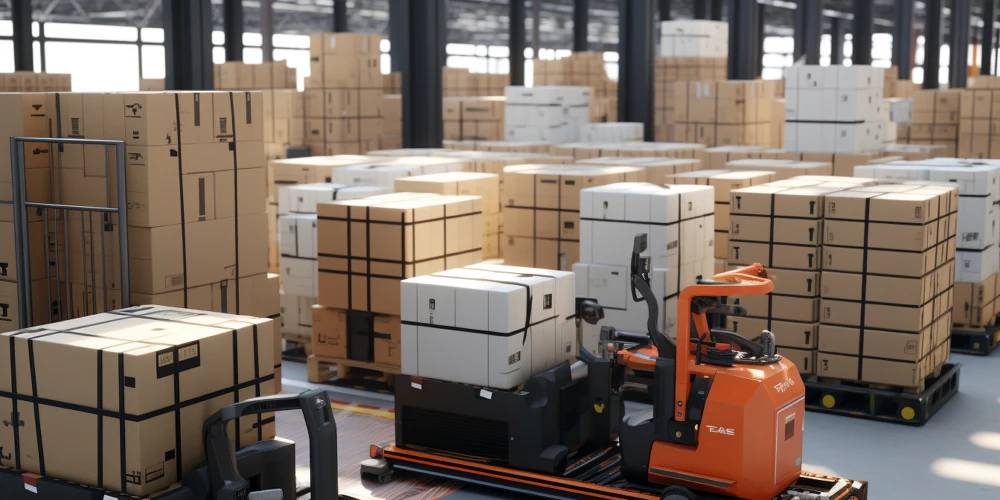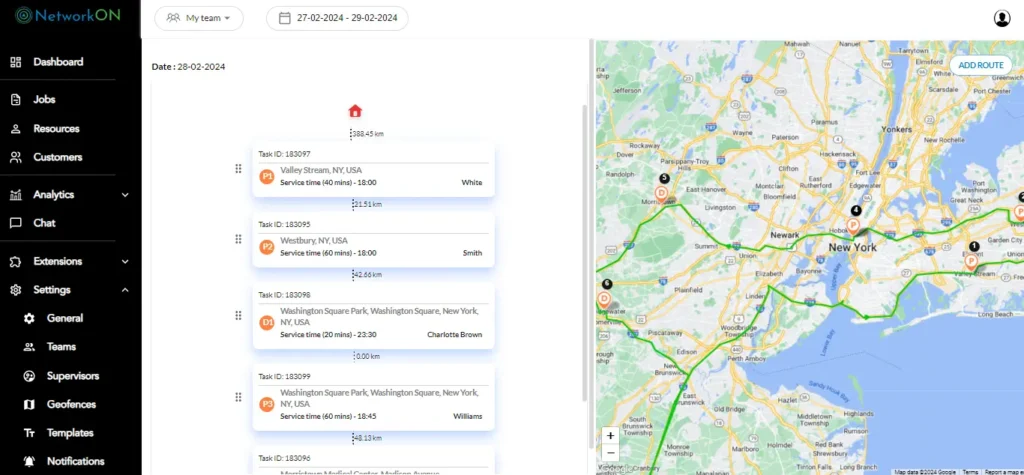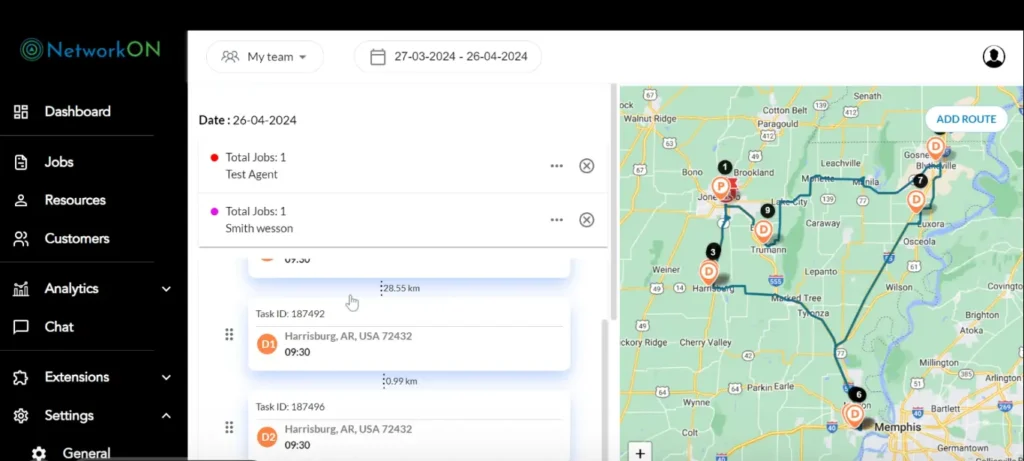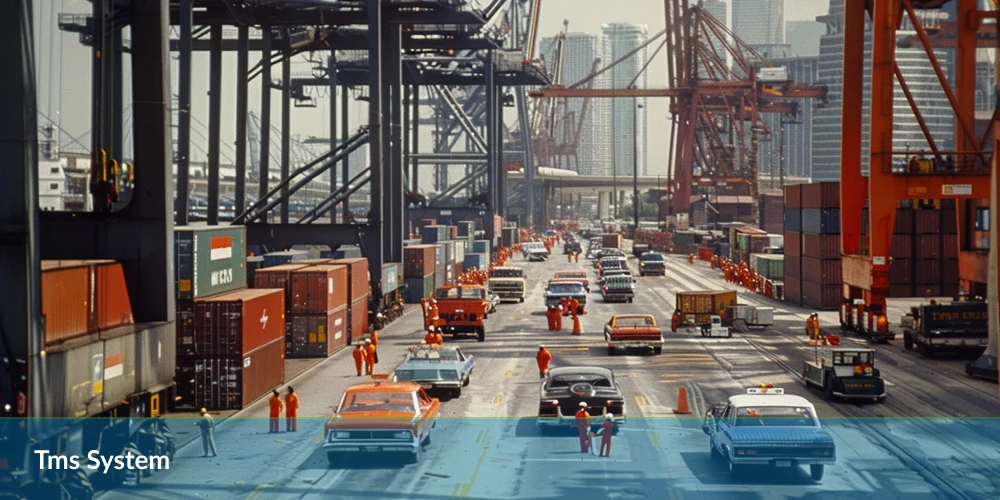Table of Contents
Transportation Management Software (TMS) serves as the linchpin in the orchestration of commodity movement, streamlining the multifaceted logistics of shipping. By adopting a robust TMS, businesses experience unprecedented control over their transport operations, enhancing efficiency and cost-effectiveness. Through the consolidation of shipping processes, a TMS facilitates real-time decision-making, optimizes route planning, and ensures compliance with regulatory standards.

TMS Systems deployment is not merely an upgrade but a transformational step. It becomes the core engine driving the whole freight movement process, synchronizing the interplay between carriers, shipping schedules, and tracking systems to deliver a seamlessly managed supply chain.
Optimizing Freight and Carrier Management with TMS
A TMS System transforms the complex symbiosis between freight movement and carrier relationships into a streamlined process. Different carriers offer varying pricing structures, service levels, and transit times; selecting the right one for each shipment would be a painstaking process without modern Touched by TMS solutions. These systems facilitate decision-making by providing centralized access to carrier data and comparative insight regarding rates, service quality, and availability.
Consistent delivery experiences are a core deliverable in logistics. TMS System ensures freight management processes effectively adapt to company policies and customer expectations. Businesses can rely on consistent delivery times, quality, and cost by automating the selection of optimal shipping routes and carriers. This automation plays a critical role in maintaining the fidelity of a brand’s service promise.
Carrier compliance can pose significant challenges. Enhanced by TMS, automation extends into compliance management, mitigating risks associated with contractual violations or regulatory non-adherence. The software prompts carriers, ensuring necessary documentation is prepared, regulations are observed, and standards are met. This level of automation reduces human error and heightens compliance.
- By centralizing carrier information, TMS aids in selecting the most effective transportation modes and schedules.
- The software’s analytical tools enable tracking carrier performance over time, influencing future carrier selections and negotiations.
- Automated alerts and reminders within TMS ensure that freight handlers and carriers adhere to predetermined schedules and requirements, safeguarding operational tempo.
Questions of carrier reliability, cost analysis, and regulatory compliance are answered effortlessly through the integration of TMS into freight and carrier management workflows. The result is a dynamic, responsive freight transport operation that readily aligns with strategic business outcomes and customer satisfaction metrics.
Unveil the Strategic Advantages of Route Optimization and Planning
Optimizing routes contributes to more than just finding the shortest path from point A to point B; it sets the stage for significantly more efficient delivery operations. When logistics managers harness the capabilities of a TMS System for this task, they can dramatically reshape their delivery and distribution strategies.
Dynamically Navigate with TMS

Transportation management systems excel at enabling dynamic routing and real-time adjustments. Conditions change – traffic delays, weather disruptions, and last-minute order modifications all influence the ideal route. TMS responds to these fluctuations by recalculating routes on the fly, which assures that deliveries proceed with maximal efficiency regardless of unforeseen events.
Slash Fuel Costs and Expedite Deliveries
By facilitating better planning, TMS directly impacts the bottom line by minimizing fuel costs. As fuel expenditures often represent one of the heaviest burdens in transportation budgets, the ability to reduce them through optimized routing is a strategic financial lever. Concurrently, these systems diminish delivery times, which amplifies customer satisfaction and gives businesses a competitive edge.
- Expect fuel savings as a TMS identifies the most efficient routes, determining vehicle type and cargo requirements.
- Anticipate deliveries to reach destinations faster due to the depreciation of delays and more direct routing.
- With optimized routing, TMS enables drivers to complete more deliveries within the same time frame, thus boosting productivity.
Adopting a TMS System positions companies to master the intricate dance of logistics with foresight and agility. This advanced route optimization and planning capacity improves operational performance. It elevates the entire supply chain to a new echelon of efficiency and service quality.
Achieving End-to-End Supply Chain Visibility
Visibility throughout the supply chain marks a keystone in management. A TMS system enables operations to monitor goods from origin to destination. By harnessing sophisticated tracking technologies, users gain a transparent view of the shipping process. Real-time tracking, complemented by traceability, is a foundation for informed decision-making.
With a TMS system, stakeholders receive timely data on shipment progress. This access feeds directly into customer satisfaction, enhancing the reliability of their experience. Supply chains no longer operate under veils of uncertainty; TMS reveals the precise location and status of each order. This level of insight fosters customer trust; clients no longer wonder about their orders’ whereabouts.
Real-Time Tracking’s Impact on Customer Trust

Customers expect updates at their fingertips. Integrating TMS into an operation equips it to meet these expectations. Hence, the platform’s capability to provide continuous real-time data strengthens the bond of trust between supply chain operators and their clients.
How Traceability Enhances Customer Satisfaction
The ability to trace shipments back through every stage in the supply chain not only combats issues like loss and theft but also bolsters customer assurance. Clients value the ability to verify the journey their goods have undertaken. This transparency translates into higher satisfaction scores and contributes to sustained client relations. Tracking in real-time yields insights that inform service improvements, leveraging customer feedback to enhance subsequent deliveries.
- Real-time tracking and traceability upgrade the cargo monitoring experience, granting immediate access to shipment statuses.
- Visibility into the supply chain translates directly into client trust, maximizing client retention rates.
- Customer satisfaction experiences an uplift as clients receive unrivaled transparency concerning their shipments.
Maximize Savings with Load Consolidation and Shipment Pooling through TMS
The logistics industry constantly seeks methods to reduce expenses without compromising service quality. Load consolidation and shipment pooling are remarkably efficient practices, merging smaller shipments bound for the same destination into one larger shipment to save on transportation costs. TMS systems are indispensable in realizing these consolidations by meticulously analyzing shipment variables and recommending harmonized transportation plans.
Deciphering Load Consolidation and Shipment Pooling
By consolidating freight, businesses can capitalize on the economies of scale; moving more goods at a lower cost per unit conveys obvious financial gains. Shipment pooling further extends these savings. Multiple companies combine smaller loads into one shipment, sharing the cost benefits. These techniques not only lower shipping expenses but also streamline logistics operations.
How TMS Pinpoints Consolidation Opportunities
A robust TMS system scrutinizes numerous factors, including shipment sizes, departure times, and delivery locations. Using these data points, the system identifies potential consolidations, crafting a cohesive plan that effectively delivers multiple shipments. As a result, businesses can directly reduce the number of trips and curtail overall shipping costs.
Consolidation’s Impact on Operation Costs and the Environment
When shipment volume decreases, so does the need for transportation resources. Fewer vehicles on the road equate to diminished fuel consumption and lower emissions – a significant stride toward sustainable logistics. Combining shipments contributes to environmental conservation while trimming operational costs, proving that financial prudence and ecological stewardship coexist harmoniously.
- Load consolidation can reduce fuel usage, resulting in operational cost savings and a diminished environmental footprint.
- Shipment pooling may decrease the total number of trips required, further advancing business cost efficiency.
Optimizing Order Fulfillment: TMS as a Vanguard
TMS systems are pivotal in enhancing order management and fulfillment procedures. By automating many steps in the order-to-delivery lifecycle, these systems enable businesses to process orders with greater speed and accuracy.
Streamlining the transition from order placement to delivery ensures that products reach customers swiftly. Such efficiency enhances customer satisfaction, builds trust, and fosters long-term loyalty. TMS allows enterprises to monitor the pulse of order movements, adjusting as needed to meet delivery expectations consistently.
Utilizing a TMS effectively simplifies complex logistics operations. Companies experience fewer delays, errors, and discrepancies, leading to a smooth order fulfillment process. Real-time updates and notifications equip businesses with the intelligence to anticipate and handle issues proactively.
The impact of a refined order management system on customer satisfaction cannot be overstated. Customers’ satisfaction naturally rises When they receive their orders promptly and without hassle. This, in turn, can lead to repeat sales, positive reviews, and an enhanced reputation for the business.
- Order placement through a TMS triggers a cascade of automated tasks, ensuring order details are accurate and delivery schedules are met.
- Carrier selection and dispatch become more efficient as TMS identifies the most suitable options based on cost, route, and timing.
- Through constant surveillance and management, TMS monitors orders, rectifying potential disruptions before they escalate.
By embracing the TMS system for order management and fulfillment, businesses effectively tighten the bolts of their supply chain mechanism, ensuring a harmonious and responsive system that delights customers and secures a competitive advantage in the marketplace.
Enhancing Warehouse Operations via WMS Integration
When integrated, Warehouse Management Systems (WMS) and TMS systems create a powerful duo. The merger between the two boosts efficiency and provides unparalleled control over inventory. Successful integration renders a more cohesive logistical process, from stock entering the warehouse to goods being delivered.
The Synergy Between TMS and WMS
Merging TMS with WMS unites transportation planning with warehouse activities. This alignment leads to coordinated picking, packing, and shipping activities. Organizations leveraging these systems’ interoperability can rapidly adapt to changes, aligning their logistics strategy with on-the-ground warehouse operations.
Inventory Control Augmented
Businesses gain real-time insights into inventory levels when the TMS system interconnects with WMS. This connectivity aids in maintaining optimal stock levels, preventing overstocking and stockouts. Managers clearly understand when items arrive and depart from the warehouse, allowing for more accurate forecasting and inventory planning.
A Cohesive Logistical Procedure
Integrating TMS with an existing WMS results in a streamlined logistical operation, minimizing manual data entry and reducing errors. The fluid exchange of information between the two systems ensures that warehouse staff are well-informed of incoming shipments and that transportation teams know the status of orders. This synchronicity facilitates faster order fulfillment, improved loading dock scheduling, and enhanced customer satisfaction.
Navigating Carrier Compliance and Rate Management with TMS
TMS system is a linchpin in maintaining harmony between carriers and shippers by ensuring a smooth compliance process and controlling shipping rates. With TMS, companies witness a direct correlation between proper rate management and reduced shipping expenditures.
Moreover, adhering to carrier requirements and industry-specific regulations no longer poses a complex challenge as TMS equips organizations with standardized processes that simplify adherence protocols.
Ensuring Carrier Compliance through Standardized Processes
Standardizing compliance processes diminishes the risk of costly errors and violations arising during transportation. TMS enables businesses to automate and enforce carrier compliance, alleviating potential legal complications and improving efficiency. Organizations gain the ability to track changes in regulations and implement them promptly across the supply chain, which echoes the system’s effectiveness in upholding compliance seamlessly.
Using TMS for Effective Rate Management and Cost Control
Accessing and evaluating rate information becomes uncomplicated with a TMS. Shippers utilize this system to compare carrier rates, negotiate contract terms, and secure optimal pricing. Consequently, this strategic rate management facilitates substantial cost savings and contributes to a healthier bottom line. TMS is a comparative tool and offers insight into shipping patterns, which helps forecast and budget future transportation costs.
Aligning Compliance and Rate Management with Industry Standards
Integrating compliance and rate management practices with industry standards is a benchmark attained through TMS. The system guarantees adherence to the latest shipping regulations, offering updates and reminders on existing tariffs and trade agreements. This aspect of TMS enables businesses to stay competitive by making informed decisions when selecting carriers and service levels that align with industry benchmarks.
- Businesses leverage TMS’s abilities to automate data entry for compliance documentation, saving time and reducing human error.
- Advanced TMS platforms provide carrier performance and compliance analytics, assisting in making data-driven carrier choices.
- Using a TMS allows for the consolidation of rate information, presenting shippers with a unified interface for managing rates from multiple carriers.
Utilizing Analytics and Reporting for Enhanced Transportation Data Insights
TMS systems are foundational for gathering, analyzing, and harnessing data to advance transportation operations. Access to high-quality transportation analytics transforms raw data into comprehensive, actionable insights. A sophisticated TMS will extrapolate trends from historical data, monitor performance metrics in real time, and forecast potential disruptions or opportunities for efficiency gains.
Importance of Data Analytics in Transportation
Undeniably, transportation data analytics are at the forefront of informed, strategic decision-making. Organizations that leverage analytics benefit from improved route optimization, enhanced customer service, and cost reductions. Greater visibility into shipping patterns, freight costs, and carrier performance metrics also aids in better negotiating service terms and identifying productivity bottlenecks.
Role of TMS in Providing Actionable Insights Through Reports
A robust TMS collects vast arrays of data and distills this information into user-friendly reports. These reports can pinpoint improvements in load movements, identify the most cost-effective carriers, and expose inefficiencies within the transportation chain. Customizable dashboards empower stakeholders to view the key performance indicators most relevant to their role, driving further precision in tactical and strategic roles.
Mastering Cross-border Transportation with Advanced TMS
Cross-border transportation introduces a layer of complexity into the logistics equation. Companies must navigate varying regulatory environments, deal with tariffs, and comply with international shipping laws. A TMS system stands as a game-changer, simplifying these intricacies. Supply chain managers leverage TMS to gain visibility over cross-border operations, ensuring the smooth transit of goods and adherence to diverse regulatory requirements.
Easing Customs Brokerage with TMS
A sophisticated TMS system serves as a critical ally in customs brokerage. The system automates the submission of necessary documentation, helping businesses avoid delays caused by paperwork errors or omissions. This digital assistance facilitates the efficient clearance of goods through customs, reducing border bottlenecks. By automating tariff and duty calculations, TMS also aids businesses in ensuring accurate and timely payments—critical to maintaining cash flow and avoiding penalties.
Mitigating Risks in International Transport
Risk mitigation is proactive when relying on a robust TMS. The system offers tools for tracking shipments in real-time, thereby providing actionable insights to preempt potential issues such as delays or route blockages. Comprehensive reports generated by TMS enable logistics managers to scrutinize carrier performance and freight costs, which can be pivotal in adjusting strategies to manage international transport risks better.
With a dependable TMS, businesses streamline compliance management. Real-time alerts and updates about changes in international trade regulations keep companies one step ahead, ensuring they adjust operations swiftly to maintain compliance. Consequently, TMS plays a crucial role in bolstering a company’s reputation by reducing the incidence of non-compliance-related legal issues.
Overall, implementing a robust TMS simplifies the complexity of cross-border transportation and customs brokerage, providing an indispensable tool in modern logistics operations engaged in international trade.
Unlocking Flexibility with Cloud-based TMS Solutions
Cloud-based TMS systems revolutionize logistics operations. By elevating the capabilities of conventional TMS software, these cloud solutions enable transportation companies to adapt to variable business needs with agility. In contrast to on-premises software that may confine businesses to fixed capacities and longer update cycles, cloud-based TMS is inherently scalable.
Advantages of transitioning to a cloud-based TMS
Organizations experience immediate benefits when adopting cloud-based solutions. Without the need for substantial upfront hardware investments, these systems reduce capital expenditure. Moreover, providers ensure continuous updates and improvements, alleviating the burden of manual software upgrades. The pay-as-you-go service models common with cloud offerings translate to operational expenses that can scale with usage, avoiding unnecessary financial strain.
How cloud solutions offer scalability and flexibility for transportation companies
The nature of cloud solutions lies in their scalability and flexibility. A surge in demand necessitates rapid system scaling, which cloud-based TMS accomplishes without compromising performance. Conversely, during lulls, businesses can scale back, optimizing cost efficiency. This elasticity enables companies to react swiftly to market changes or seasonal shifts in demand, ensuring they are well-equipped to handle unforeseen challenges.
Impact of cloud-based systems on remote management and collaboration
The ability to manage operations remotely has become indispensable. Cloud-based TMS fosters collaboration across departments and partners by granting access to essential functionalities from anywhere with an internet connection. Remote teams can interact with both real-time and historical data, improving decision-making. Additionally, the cloud enhances data security with robust protection measures managed by experienced vendors, ensuring that sensitive data remains safe even in a decentralized work environment.
Keeping Track of Returnable Assets
Returnable assets like pallets, crates, and containers are pivotal in logistical processes. These items circulate between various stakeholders – suppliers, transporters, and customers, creating a need for precise tracking mechanisms to ensure their return and continued reuse. By implementing a TMS system, companies can monitor these valuable assets with improved accuracy, enhancing inventory control and reducing loss or misplacement.
TMS Features for Returnable Asset Management
Advanced TMS solutions are equipped with functionalities dedicated to managing returnable assets. Real-time visibility into asset location is facilitated through features such as barcode scanning and RFID technology. Users can track the status of each item, view transaction histories, and receive alerts when assets are not returned within the expected timeframe. This information is pivotal in optimizing the use of returnable assets and preempting potential issues in the supply chain.
Cost Reduction Through Enhanced Tracking
Losing track of returnable assets can result in substantial financial losses over time. A robust TMS system mitigates this issue by providing detailed insights and analytics concerning asset usage and turnover rates. Such data empowers businesses to identify patterns, predict needs, and implement corrective measures when discrepancies arise. As a result, companies can anticipate reduced expenditure tied to replacing lost assets and an overall uptick in process efficiency.
- Streamlines returnable asset tracking, ensuring each item is accounted for from departure to return.
- Facilitates allocation and redistribution, effectively reducing the need for redundant asset investment.
- Provides detailed reporting, enabling businesses to make informed decisions about their asset pools and manage them proactively.
Pursuing Sustainability in Logistics through TMS
Logistics operations leave a significant environmental footprint, yet advancing technology, particularly the TMS system, propels the industry towards eco-friendly practices. The intersection of environmental sustainability and logistics forms a core concern for contemporary businesses, who now leverage TMS to diminish the carbon footprint associated with transportation activities.
The Intersection of Environmental Sustainability and Logistics
Forward-thinking companies recognize that reducing emissions and conserving resources can go hand in hand with streamlining logistics. Leveraging TMS, businesses gain the capability to analyze and optimize their transportation networks. This optimization translates to cost savings and lessens fuel consumption and emissions by reducing miles traveled and idle times for transport vehicles. This convergence of economic and environmental goals marks a significant shift in how companies approach logistics and sustainability.
How TMS Contributes to Reducing the Carbon Footprint
TMS platforms facilitate more than mere route planning; they are robust tools that enable shippers to select the most efficient modes of transportation. TMS drives down the required frequency and number of trips by consolidating shipments and enhancing load capacity. Furthermore, advanced TMS can identify eco-friendly carriers that utilize alternative fuels or up-to-date engines, contributing to reduced greenhouse gas emissions. Consequently, businesses can significantly trim their carbon footprint by selecting optimal modes and carriers.
Promoting Eco-Friendly Practices through Smarter Logistical Decisions
Integration of TMS allows companies to take a dynamic approach to logistics, providing the agility to respond quickly to changing market needs while considering environmental impact. Companies can use data analysis tools within TMS to assess the environmental implications of their logistics choices and opt for the greenest alternatives without compromising efficiency. By encouraging smarter logistical decisions grounded in real-time data, TMS becomes an indispensable asset in the journey toward sustainable transportation management.
The Edge of Real-time Tracking and Traceability in Customer Service
Tracking shipments in real time revolutionizes customer service by providing unparalleled visibility. Customers can monitor their orders from departure to arrival, harnessing a sense of control and reassurance. This tracking is not merely a benefit but a standard expectation in contemporary logistics and e-commerce landscapes.
Companies use a TMS system to offer customers a transparent view of the delivery process. Real-time data transmitted by TMS systems allows for accurate updates on shipment status, leading to enhanced customer experiences. Clients appreciate this openness, often culminating in increased brand trust and reinforcing customer loyalty.
Consistent and reliable delivery tracking fortifies customer relationships. Shippers equipped with advanced TMS solutions empower clients with knowledge, fostering confidence in the service provided. Companies uphold their commitment to customer satisfaction and operational excellence by cultivating transparency in the delivery process. The complexity of transportation logistics dissolves into simple, comprehendible updates that keep all parties informed and content.
- Real-time tracking equips customers with immediate shipment locations and estimated arrival times, facilitating better planning and coordination.
- TMS software enhances customer service teams, offering detailed information to address inquiries and resolve issues promptly.
- Transparent traceability catalyzes building long-term customer relationships centered on trust and accurate service delivery.
Key Takeaways
Enhanced Efficiency and Cost-Effectiveness: The TMS System significantly improves operational efficiency by streamlining logistics processes, optimizing route planning, and consolidating shipping operations. This results in reduced fuel costs and expedited delivery times.
Real-Time Decision-Making and Compliance Management: The TMS System provides real-time tracking and decision-making capabilities, ensuring regulatory compliance and minimizing risks associated with contractual violations or regulatory non-adherence. Automation within TMS enhances accuracy and reduces human error.
Improved Customer Satisfaction and Trust: TMS System strengthens customer relationships and trust by offering real-time tracking and transparency. Customers benefit from timely updates on shipment progress, leading to higher satisfaction and better customer retention rates.
Scalability and Flexibility with Cloud-Based Solutions: Cloud-based TMS System offers scalable and flexible solutions that adapt to changing market demands and seasonal fluctuations. These systems reduce capital expenditures and provide remote management capabilities, enhancing collaboration and data security.
Sustainability and Environmental Impact: The TMS System contributes to sustainability by optimizing routes, reducing fuel consumption, and enabling load consolidation. These practices help lower transportation activities’ carbon footprint, aligning logistical operations with environmental conservation goals.
Maximize Your Operational Efficiency with TMS
A TMS System transforms how transportation companies conduct business. It integrates key logistics processes, from order management to inventory control, to ensure that operations run precisely and efficiently. The technology streamlines freight movement and elevates customer service to new heights through real-time tracking capabilities. Transportation companies that leverage a comprehensive TMS position themselves to manage logistics effectively, ensuring client and stakeholder satisfaction.
Optimization is at the forefront of the TMS System. Route planning becomes more strategic, enabling businesses to save time and reduce fuel costs. Warehouse operations become more fluid through integration with Warehouse Management Systems (WMS), and inventory is managed more accurately. The ability to analyze and report transportation data means companies can make informed decisions that drive further improvements and cost savings. Moreover, advanced solutions in cloud-based TMS offer unprecedented flexibility and scalability to adapt to changing market needs and customer expectations.
Compliance, a complex facet of transportation, becomes manageable through TMS’s rigorous carrier management functions. Equally, cross-border trade challenges are navigated with increased confidence, mitigating risks and streamlining customs processes. In sustainability, TMS helps companies reduce their carbon footprint by optimizing routes and loads, contributing to the larger goal of environmentally responsible logistics.
The benefits of the TMS System are comprehensive, impacting nearly every aspect of transportation and logistics. Adopting such a system propels companies to the forefront, allowing them to maintain a competitive advantage and respond proactively to market demands and customer needs. Consequently, adopting a TMS System is not merely an operational decision but a strategic move toward growth and continual improvement.
The next step is clear for companies aiming to experience the full range of benefits that a TMS System can offer. Engaging with experts through a demo or consultation can unlock insights into the right TMS solution tailored to specific organizational needs. Every transportation company’s journey toward optimization and efficiency is unique, making personalized guidance invaluable.
Ready to elevate your transportation management? Explore NetworkON’s innovative solutions by scheduling a demo or consultation today. Embrace the future of the TMS system with NetworkON as your pivotal tool for success!
Frequently Asked Questions
Q1: What is a TMS system, and how does it benefit my business?
A TMS system is designed to streamline a business’s logistics and transportation operations. It offers route planning, carrier selection, freight auditing, and real-time tracking tools. Businesses can use a TMS to improve efficiency, reduce transportation costs, ensure regulatory compliance, and enhance customer satisfaction through timely and transparent delivery updates.
Q2: How does a TMS system help optimize routes and reduce fuel costs?
A TMS system utilizes advanced algorithms and real-time data to plan and optimize delivery routes. It considers traffic conditions, weather, vehicle type, and cargo requirements to determine the most efficient paths. By minimizing unnecessary mileage and idle times, a TMS helps reduce fuel consumption and fuel costs, saving money and reducing the environmental impact of transportation operations.
Q3: Can a TMS system handle international shipments and customs regulations?
Yes, a robust TMS system is equipped to manage international shipments and navigate the complexities of cross-border trade. It automates the submission of necessary customs documentation, calculates tariffs and duties, and ensures compliance with varying international shipping laws and regulations. Real-time tracking and automated alerts help mitigate risks and ensure timely clearance of goods through customs, facilitating smoother international logistics operations.
Q4: What are the advantages of using a cloud-based TMS system over an on-premises solution?
Cloud-based TMS system solutions offer several advantages over on-premises systems. They provide greater scalability, allowing businesses to adjust resources according to demand fluctuations without significant upfront investment. Cloud-based systems also ensure continuous updates and improvements, reducing the need for manual software upgrades. Additionally, they enable remote access and collaboration, enhancing flexibility and operational efficiency. With robust data security measures managed by the service provider, businesses can also trust that their sensitive information remains protected.





0 Conversations